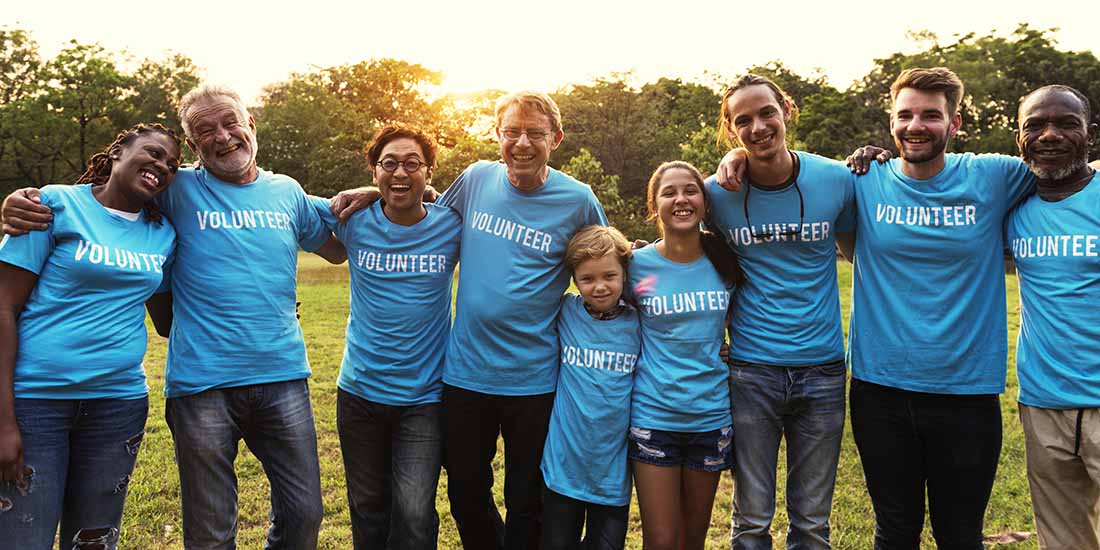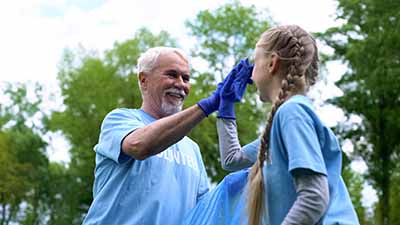 Contact
About Us
Articles
Home
Contact
About Us
Articles
Home

Does the theory that you only get what you give hold up when looking at mental health? Some emerging research suggests that giving back really might be the secret to improved well-being and mental health. Of course, nobody is suggesting that volunteering and altruism are the cures for serious mental disorders. However, it's easy to see how giving our time and effort to benefiting others may help to lift us from our own "slumps" in life. This can be especially true for older Americans because giving back often leads to a greater sense of purpose and belonging. The importance of being part of a community has become more apparent as so many older Americans are being forced into social isolation during COVID-19. In fact, the emotional and psychological impacts of COVID-19 may be contributing to a crisis of mental health that is bubbling just under the surface. Is giving back the antidote?
"Public health actions, such as social distancing, can make people feel isolated and lonely and can increase stress and anxiety," according to the CDC. The CDC specifically highlights both the elderly and people who live in isolation as being at greater risk for depression, anxiety and other mental health issues as a result of COVID-19. However, the agency suggests that coping with stress in healthy ways can enable each of us to make ourselves, the people we care about and our communities stronger. While challenging, there are some ways that isolated senior citizens can still feel that they are positively contributing to and connecting with society. We'll cover one real-life example of finding meaningful ways to help while socially distancing in just a bit. First, it's important to cover what research is showing us about the importance of social connection by way of giving back and helping others in relation to happiness.

Being generous with others has generous benefits for your health. In fact, the link between doing good and feeling good is so strong that some in the medical community refer to the side effect of volunteering as the "helper's high." Researchers at the National Institutes of Health coined the phrase after finding that the MRIs of patients who gave to various charities exhibited highly stimulated mesolimbic pathways. The mesolimbic pathway is what's known as the "reward center" of the brain that helps to release feel-good endorphins.
There's also very strong evidence to suggest that giving back helps us live longer! A study done at the University of California, Berkeley, found that people above the age of 55 who volunteered for two or more organizations were 44 percent less likely to die over a monitored five-year period than those who did no volunteering. In addition, research done at the University of Michigan also found longevity to be stronger in elderly people who helped friends, neighbors and relatives.
We can look at a newly released study from 2020 in the Journal of Happiness Studies for the latest and greatest research regarding the volunteering-happiness connection. Researchers used data from nearly 70,000 subjects over a time period spanning 18 years to get a glimpse of the impact volunteering habits can have on mental health and the development of coping strategies. What did they find? Here's a look at the highlights:
Many older adults would be eager to find ways to give back after hearing about these benefits under normal circumstances. However, COVID-19 places a very obvious roadblock to reaching out to help. Luckily, some savvy senior citizens have found ways to give back while staying socially distanced.
One of those clever seniors finding ways to give back during COVID-19 is a woman named Betty. At 70 years of age, Betty has always had a passion for helping others. The COVID-19 pandemic left her with few options for altruism until she decided that helping to keep others safe could give her the motivation needed to keep going. That's when the accomplished seamstress began sewing masks and surgical caps to donate to the local hospital. Betty often spends several hours per day using her skills to create high-quality, attractive masks to give away. Betty feels that her one-woman mission to keep people in her community safe gives her a sense of accomplishment and satisfaction even though she can't be out on the front lines to help. In addition, it helps her to stay active and occupied during what can feel like long days at home. Betty's mission to make sure nobody in her community is without a mask is a perfect example of using one's passions and talents to stay busy while contributing. In fact, Betty's kind act ensures that a "piece of Betty" really is out there helping the community even though she is unable to safely spend much time away from home at the moment.
Not every senior citizen is a skilled seamstress who can whip up masks. However, everyone has something to give that can help them to feel connected and get that "giver's high" during COVID-19. In fact, getting the rewards of giving back may be as easy as reaching out on the phone to check on friends and neighbors.
Alliance America is an insurance and financial services company. Our financial planners and retirement income certified professionals can assist you in maximizing your retirement resources and help you to achieve your future goals. We have access to an array of products and services, all focused on helping you enjoy the retirement lifestyle you want and deserve. You can request a no-cost, no-obligation consultation by calling (833) 219-6884 today.


